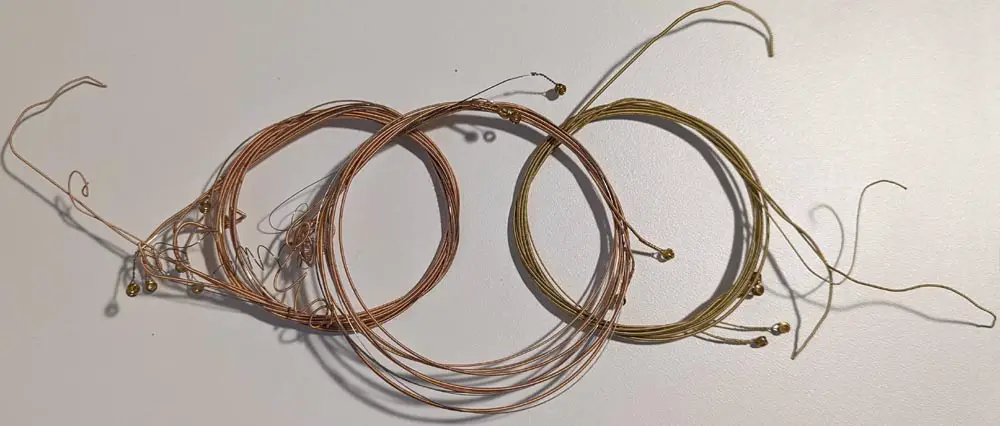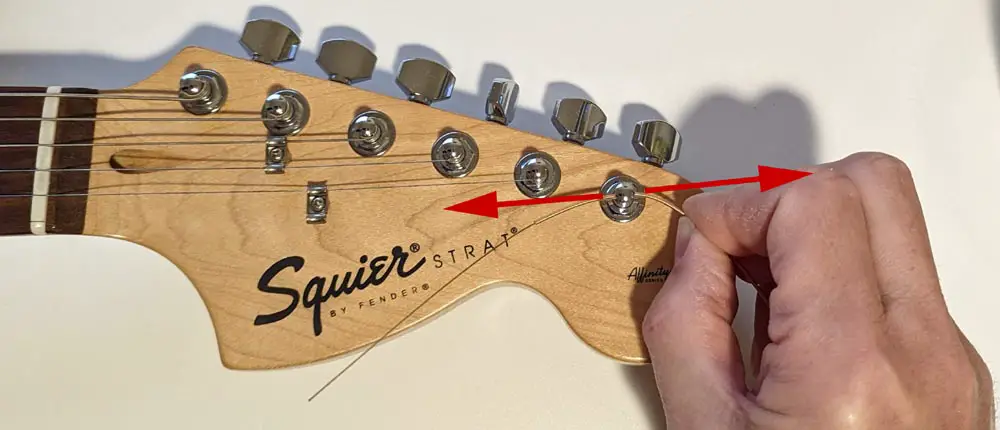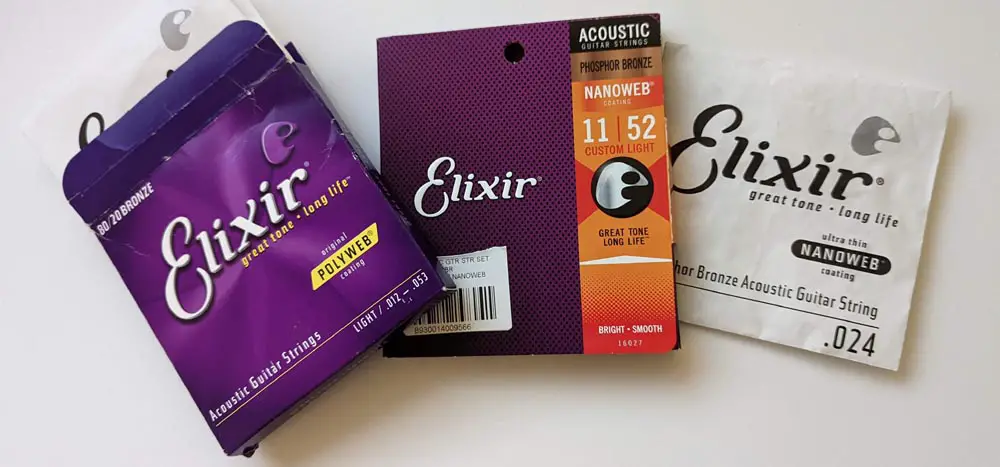How Long Do Guitar Strings Last (How Often Do They Break)?
We’ve all dealt with the hassle of a broken guitar string. Once one goes you usually need to buy a whole new set! Strings usually break while practicing, so I’d say a lot of us are guilty of replacing just the string that broke and carrying on as If nothing happened!
The general rule of guitar strings is that they should last 100 hours of practice or 3 months. This depends on many factors from string types to different play styles. Heavy strumming stresses strings, and bending can create weak points over time, which can shorten string life.
But what if you’re not supposed to get to the point where strings start to break?
If your strings are breaking too often then it’s time to sort out why, and find out how to get more life from your strings.

We work with various affiliate programs. If you purchase via our links we may earn a small commission at no extra cost to you.
Do Strings Last Longer on Acoustic Guitars than Electric Guitars?
Leaving your strings on longer is more common on acoustic guitars than it is on electrics.
Acoustic guitar strings are usually higher gauge than electric strings, meaning they can take far more of a beating before they weaken to the point of breaking.
Acoustic strings are also made with bronze which means they don’t rust like electric strings that are made with nickel. Corrosion is the enemy of your strings, and can cause electric guitar strings to prematurely break.
The bridge on an acoustic is also gentler on the strings, preventing knots from forming and causing string breakage.
Do Nylon Guitar Strings Break More Often than Steel Strings?
While the plastic nature of nylon strings might make them seem more prone to breaking, in reality it’s the other way around.
Nylon strings don’t break often because they can withstand tension better than steel strings. Where steel strings are prone to unwinding and snapping, nylon strings tend to stretch easier.
This lets them take more of a beating before calling it a day.
Do Different Types of Strings Last Longer?
Generally speaking the more heavy-duty your strings are, the longer they’re going to last! This can be determined by a few factors.
Thicker strings are capable of handling more tension and harder strumming. Thinner strings on the other hand need to be handled a bit more delicately and will start to wear significantly faster than heavier gauges.
There’s also a difference in the lifespan of your strings depending on what materials they’re made from.
Strings made of nickel (like those found on electric guitars) are prone to rusting after being installed for a while. Copper strings (found on most acoustics) on the other hand don’t rust, making them last longer.
Possibly the biggest thing that can prolong the life of your guitar strings is if they are coated. Coasted strings can sometimes last 3 to 4 times longer than uncoated strings.
The extra coating helps to keep your strings clean and helps offset the effects that sweat and oils from your fingertips have on your strings.
Are Your Strings Breaking Too Often?
Age isn’t the only cause of string breakage. While 3 months is about the average lifespan of a set of strings this doesn’t mean they should break after 3 months. If that’s happening to you there is guaranteed to be another problem.
If you’re a beginner and your strings seem to be breaking often, then your technique is possibly to blame. I know you probably want to be Tom Morello and bash the living daylights out of your guitar strings but in doing so you’re ruining your strings.
Guitars are sensitive instruments that don’t require a ton of power to sound massive. Play with more control instead of more power. This will not only make your playing sound better but your strings will last way longer.
What Causes Strings to Break?
Condition of Strings
The single biggest reason your strings are going to break is wear and tear. Guitar strings go through a lot and deteriorate over time. Over time your strings are certain to get gritty picking up dirt from your fingertips no matter how clean your hands are.

The sweat and oils your fingers produce also contribute to wearing down your strings stripping them of their natural coating and exposing the copper or nickel to dirt.
Rust is another thing to look out for. This is only a problem for nickel electric guitar strings and the rustier your strings get the worse they’ll be at handling tension and movement on the fretboard.
Environmental Factors
Where you play and store your guitar can also have an impact on your strings. Rapid temperature changes and moisture are the main things to be careful of.
Moving your guitar from a warm environment to a cold one, or vice-versa will most likely cause your strings to de-tune themselves. This is a byproduct of the expanding and shrinking of the guitar’s wooden body.
Playing Style
Hammering your guitar with hard picking will get you a one way ticket to breaking your strings.
The harder you play the more pressure you’re putting on the tension of your strings to bend to your will and they can only take so much. Over time they’ll begin to unwind this creates weak points that are prone to snapping!
The same goes for string bending and tremolo use. While they are great techniques for creating interesting intonation in your playing it takes its toll on your strings.
The use of tremolo is especially common in genres like shoegaze where nearly every chord is swept back and forth with tremolo. So don’t think it’s something you shouldn’t do; just be prepared with an extra packet of strings if you’re making use of it.
Physical Issues With the Guitar
There are a few main areas of your guitar to keep in check.
- The nut.
- The Frets.
- The Bridge.
- Tuning posts.
These are high tension areas of your guitar and if they become dirty or jagged they can wear your strings down!
Let’s check out what you can do to resolve these issues…
How to Make Your Strings Last Longer Before Breaking
Giving your strings a quick clean before each practice session is the number one way to keep them at peak performance.
A simple wipe down with a microfibre cloth should do that trick if you do it regularly. If you haven’t given them a clean in a while; using a bit of isopropyl rubbing alcohol will help get any baked-in dirt off your strings.
Storing your guitar correctly between playing sessions will also make your strings last longer. Keeping your guitar in a case, and away from damp places will help maintain the condition of your strings for longer.
There are also some physical issues with your guitar that can lead to string breakage.
- If your strings seem to be breaking near the nut then it’s likely that dirt and grit has built up in the slots your strings run through. Make sure to give these a good clean before restringing next time.
- If your breaks seem to be happening near the tuning posts there’s a chance the edges of the post have become harsh and jagged.
Smoothing them out should fix this issue. A great way to do this is to take an old string and roll it back and forth through the post.

- Frets can also be a point of destruction for your strings. The edges of your frets can sometimes become sharp, not enough to cut you; but with continuous playing, it’s enough to wear your strings down.
Smoothing them out with a bit of sandpaper should sort you out.
- If your strings seem to always break near the high end of your fretboard, then your bridge might be to blame. This is a problem commonly found on new guitars as the saddle that your strings run over can be too sharp.
The bridge is a high tension point on your guitar so you can probably guess why a sharp saddle is bad news for keeping your strings in tack. Sandpaper will do the trick to smooth out your saddle. Use a fine 600 grit to start, and work through to 1200 grit to really polish it out.
String Brands & Types That Last Longer
Coated strings only came about in the 1990’s, and before then, planning for a mid-gig string snap was basically a given. With a couple decades of experience coated strings have become a great option for longer lasting strings.
The go to coated strings are Elixir Nanoweb and Polyweb Steel strings. These strings feature a coated finish that will make them last 2 or 3 times longer than standard steel strings. So you might be able to get a good 6 months to a year without having to change them.

Get Elixir Polyweb & Nanoweb guitar strings
Nanoweb strings will give you a brighter and warmer sound, while Polyweb strings will give you faster movement and a warmer sound. Most people prefer the Nanowebs but it comes down to personal preference and play style.
If you’re not a fan of the way coated strings sound then you should try stainless steel strings. The Ernie Ball Super Slinky Stainless Steel strings are some of the best. Unlike standard nickel strings, they’re resistant to rust and dirt build-up extending their life when compared to cheaper nickel strings.

Get Ernie Ball Slinky Stainless Steel Electric Guitar Strings
Another great choice for uncoated strings are NYXL D’Addario strings. They’re designed to increase tuning stability by 131%. This makes them perfect for using bends and tremolos.

Get DAddario NYXL Electric Guitar Strings
How Long Should Guitar Strings Sound Good For?
Steel guitar strings will usually keep their tone for about 3 months or about 100 hours of playtime. After that, they can start to sound dull, no matter what guitar you have.
This 3 month period isn’t a hard and fast rule however if after 3 months your strings are still sounding great then keep using them! Some guitarists will leave the same strings on for 6 months or more.
Acoustic guitar steel strings will typically sound better for longer in comparison to an electric when played an equal amount.
Acoustic guitar strings also take some breaking in to get them sounding warm and bright. A bit of dirt on your acoustic strings will actually help your tone. Electric strings don’t have the nuance as the pickups amplify the clean tone of brand new strings.
Nylon strings on the other hand rarely need to be changed and will last several months a set. The thing to watch out for with nylon strings are the bass strings these will often lose their tone 2 -3 times quicker than treble strings.




